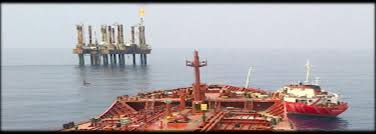The Public Interest and Accountability Committee (PIAC) yesterday called on the Ghana National Petroleum Commission (GNPC) to make a decision to decommission the Saltpond Oil Field (SOF) in the Mfantseman Municipality of the Central Region.
At a public forum on the management and use of Ghana’s petroleum revenues held at Cape Coast on Tuesday, the committee said they believe the huge cost of staff maintenance will be reduced since the oil rig had become an economic burden if the move takes place.
Speaking at the forum, Mr Noble Wadzah, Chairman of PIAC, stated that
“the continued use of oil revenues to cater for an idle field did not reflect judicious use of the resources.”
He also explained that because the SOF was not producing anymore it’s needful to decommission it to reduce unnecessary expenditure and also pointed out that commissioning a rig came with careful planning and so GNPC with the consent of the Ministry of Energy had embarked on a two-phased programme to dismantle the premier oil producing field in Ghana.
The first phase of the decommissioning will involve the preparations of a complete plan towards bringing the rig down with the second face seeing the start of the decommissioning.
The forum assembled key stakeholders including; representatives of the Central Regional Coordinating Council, PIAC member institutions, traditional and religious leaders, media and the public.
Since June 2010, the operations of the Saltpond Oil Field (SOF) was brought to a halt by the GNPC after it began incurring operational cost from a field that was producing minimally from two of its archive wells of six wells originally sunk when the field was operating in the 70s.
The PIAC chairman added that GNPC’s continuous use of oil revenue to provide maintenance cost for the offshore production platform ahead of plans to decommission was not feasible financially.
He explained that, the country’s oil revenue was being heavily drained, due to the payment of the emoluments of skeletal staff and the maintenance of the non-functional oil production facility.
Mr. Nasir Alfa Mohammed, a member of PIAC lamented that the committee lacked the legal resources to prosecute people who swindle funds of Ghana’s oil revenue allocations in spite of their statutory mandate and commitments to ensure efficient, transparent and accountable management of petroleum revenues and investments,
He iterated the need and support for PIAC to have prosecutorial powers to effectively and efficiently control the misappropriation of oil revenues.
He also made recommendations that to prevent further oil revenues misappropriation, parliament should empower and support the committee to bring about rapid national development and also make people performing their roles more accountable.
He assured of the committee’s continuous execution of its mandate with high integrity and remain independent of governmental dictatorship on the oil revenue management.
The PIAC member representing the Ghana Bar Association affirmed the PIAC’s determination to engage the media and key stakeholders in keeping track of oil revenue disbursement as means of promoting social auditing and accountability and admonished the media and other strategic stakeholders to play their roles more effectively to ensure that oil revenues were better protected.
Osabarima Kwasi Atta II, Omanhen of Oguaa Traditional Area called for the PIAC to educate and further engage the public on their directive and also work towards impelling the support of prosecutorial authorities.




















